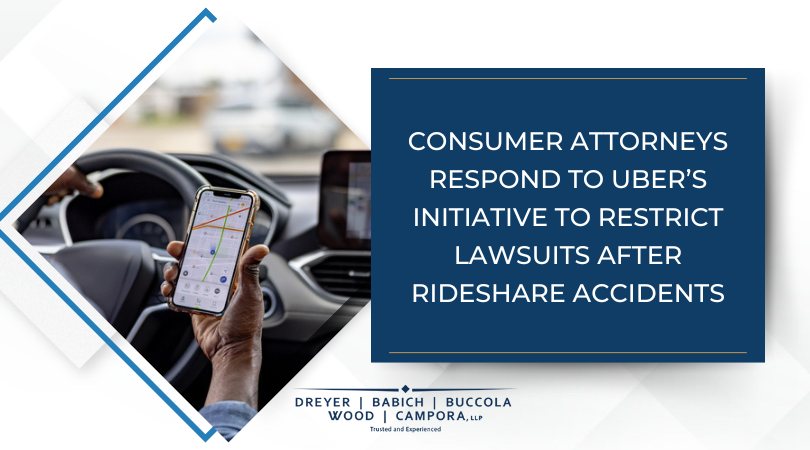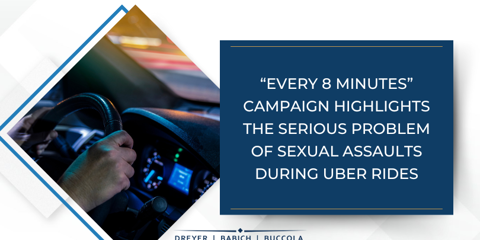In California, Uber has filed a legal initiative called the Protecting Automobile Accident Victims from Attorney Self-Dealing Act. If the initiative collects enough signatures, California voters will see it on the November 2026 ballot. While the title makes it sound like it would help people who want to file a rideshare accident claim, attorneys who represent consumers across the state see it as an intentionally misleading title.
The Consumer Attorneys of California (COAC) has issued an official response to Uber’s initiative, which you can view in full by clicking here. In the response, the COAC warns that Uber actually aims to protect itself from rideshare lawsuits by making it more difficult for riders to connect with rideshare attorneys and limiting the medical care that those attorneys can arrange for their clients. The organization is preparing to push back and educate consumers statewide about the actual impacts the initiative could have if it later passes as a bill.
Our California rideshare accident lawyers of Dreyer Babich Buccola Wood Campora, LLP understand the concerns of the COAC regarding Uber’s initiative. We always want what is best for our clients, the people in our communities, and all Californians, and we don’t think the act would help as much as it would hurt.
The three main considerations in the Protecting Automobile Accident Victims from Attorney Self-Dealing Act, and why they are problematic, include:
- Attorney fee caps: The proposed initiative would cap attorney fees at 25% for virtually all auto accident lawsuits, including rideshare accidents. Enforcing such a low cap is not in the interest of consumers when everything is considered. Car accident claims, especially those involving Ubers and Lyfts, can be incredibly complex and require hours and hours of legal work prepared by someone with advanced legal knowledge. If a low cap is enforced, auto accident attorneys would likely need to be much more selective with whom they can help pursue claims. The COAC has argued that this is exactly what Uber wants: more rideshare accident plaintiffs with no legal representation because attorneys need to focus only on very high-value, very high-stakes claims. The act also ignores the fact that nearly all auto collision and injury claims in California are taken on a contingency fee basis, which means clients don’t have to pay any attorney fees unless their cases end in their favor, anyway. Additionally, many cases are taken on a contingency fee rate between 25% and 40%, so many successful plaintiffs are already retaining a majority share of their settlement.
- Restrict medical provider access: Uber’s initiative wants to prevent personal injury attorneys from referring clients to medical providers that have a “financial or familial conflict of interest” with the attorney. However, the proposal is far too broad. Oftentimes, auto accident attorneys have a trusted selection of medical providers that have helped their clients throughout the years, so those people and clinics are the reasonable first choices when helping a client arrange medical care. It is misleading to say that the attorney has a “financial or familial” interest just because they trust a medical provider or clinic to provide great care. The act also doesn’t consider that an injured client deserves the best possible medical care, regardless of who knows the medical provider and to what degree.
- “Phantom damage” crackdown: The act wants to stop attorneys from referring clients to “expensive medical providers” to accrue “phantom damages” that increase the value of a claim. What medical care does Uber consider to be “too expensive” to be justified? The act doesn’t make this definition clear. The wording in the act seems to arbitrarily decide that someone injured in an auto accident only deserves basic and emergency medical care, even when many (if not most) auto accident survivors need ongoing specialized care and rehabilitative therapy. Would such medical care be called “phantom damage”? Possibly. For us and the COAC, the vague wording creates too great a risk of injured parties being denied medically necessary care.
Considering the above and more about Uber’s proposed initiative, we cannot say that it is the right way to improve consumer protections in California.
To learn more about Uber’s initiative that might end up on the November 2026 California ballot, you can read the full press release from the Consumer Attorneys of California by clicking here. If you need help after an Uber accident or Lyft crash in California, contact our firm online or call (916) 999-9132 to speak with attorneys who genuinely care about your recovery.

[2].jpg)
[1].jpg)
